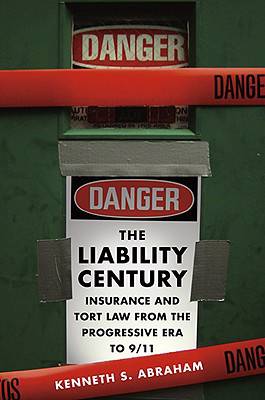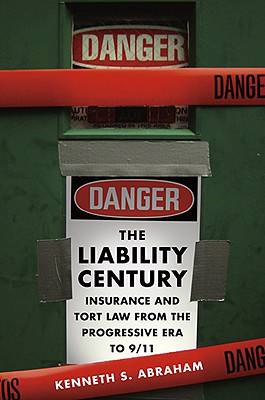
- Retrait gratuit dans votre magasin Club
- 7.000.000 titres dans notre catalogue
- Payer en toute sécurité
- Toujours un magasin près de chez vous
- Retrait gratuit dans votre magasin Club
- 7.000.000 titres dans notre catalogue
- Payer en toute sécurité
- Toujours un magasin près de chez vous
The Liability Century
Insurance and Tort Law from the Progressive Era to 9/11
Kenneth S Abraham
Livre relié | Anglais
111,95 €
+ 223 points
Description
Kenneth Abraham explores the development and interdependency of the tort liability regime and the insurance system in the United States during the twentieth century and beyond, including the events of September 11, 2001.
From its beginning late in the nineteenth century, the availability of liability insurance led to the creation of new forms of liability, heavily influenced expansion of the liabilities that already existed, and continually promoted increases in the amount of money that was awarded in tort suits. A "liability-and-insurance spiral" emerged, in which the availability of liability insurance encouraged the imposition of more liability, and, in turn, the imposition of liability encouraged the further spread of insurance. Liability insurance was not merely a source of funding for ever-greater amounts of tort liability. Liability insurers came to dominate tort litigation. They defended lawsuits against their policyholders, and they decided which cases to settle, fight, or appeal. The very idea behind insurance--that spreading losses among large numbers of policyholders is desirable--came to influence the ideology of tort law. To serve the aim of loss spreading, liability had to expand. Today the tort liability and insurance systems constantly interact, and to reform one the role of the other must be fully understood.Spécifications
Parties prenantes
- Auteur(s) :
- Editeur:
Contenu
- Nombre de pages :
- 288
- Langue:
- Anglais
Caractéristiques
- EAN:
- 9780674027688
- Date de parution :
- 01-04-08
- Format:
- Livre relié
- Format numérique:
- Genaaid
- Dimensions :
- 164 mm x 236 mm
- Poids :
- 589 g







